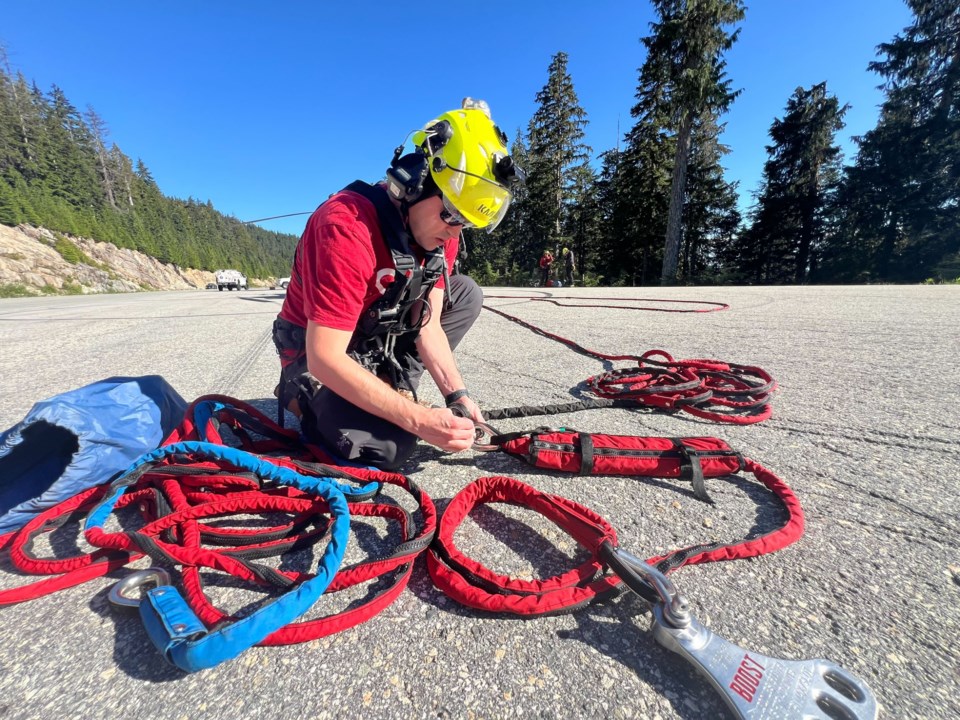Hikers stranded on Grouse mountain and six calls fielded by North Shore Rescue - the Canada Day long weekend certainly proved to be eventful for local rescue teams.
On Sunday, several hundred people were stranded atop Grouse Mountain following a breakdown of its Skyride tram, causing a number of visitors to tackle the downhill trails in a bid to head home.
“A lot of folks who were up top decided they wanted to try to walk out without really being aware of how difficult that trail out is,” said District of North Vancouver Fire and Rescue Services’ assistant chief Dwayne Derban.
Crews called out to attend to a woman in her 40s who had broken an ankle trying to descend the BCMC trail, but upon reaching her found a number of others in need of assistance, said Derban.
"We had to call North Shore rescue for additional manpower,” he said, adding that one of the patients had been suffering a decline in vital signs and a lowered pulse rate. “We were preparing for a pretty serious event, but luckily he stabilized and was able to be carried out to the ambulance before anything drastic happened."
Descending Grouse can be more gruelling than people realize, Derban said. First responders in “stellar shape” would rarely choose to make their way down the trail, even if the patient was nearer the mountain peak.
“Usually if a respondent is trapped somewhere within the top half of the trail, responders will hike up rather than riding the cable car and running down, because the rundown is far more debilitating than the way up,” he said. “With the hike up, your muscles are used to that type of work where you’re pushing all the time, as opposed to the run down where your joints and muscles are doing a compression workout and you’re absorbing the impact.”
The number of people facing minor injury and exhaustion would likely have tallied far higher, said Durban, as there were plenty of others in “a fair bit of distress” who chose to tough it out.
Other more serious incidents kept rescuers very busy over the long weekend, said Allan McMordie, search manager for North Shore Rescue.
From Thursday through to Monday, the team fielded six calls, including the two to assist the DNVFRS at Grouse, he said.
Things kicked off in the early hours of Thursday morning with the rescue of a lost man, who had to be hoisted from Lynn Canyon after spending two nights lost and exposed to the elements in the wider Lynn Creek area.
As Canada Day was just beginning at around 1:30 a.m. Monday morning, North Shore Rescue were busy managing a call from two men in their late teens and early twenties who had taken their mountain bikes up Seymour Valley, climbed Mount Burwell and had struggled to make their way back down.
“They got a late start, didn’t summit until later, and on their way down, they got into darkness, and called to say they were exhausted,” he said.
The hikers had flashlights, weren’t injured, and had “good communication” via their cell phones and so ultimately agreed to sleep for a few hours before making their way back down in the daylight.
Come Monday afternoon, the rescue team were called to another broken ankle, this time on the Howe Sound Crest trail from a woman descending St. Mark’s Summit.
“She had all her gear and really good boots, but it just got very slippery and she took a bad step and heard a crack – a bone breaking,” said McMordie.
Volunteers put the woman's ankle in a cast boot and flew her to Cypress Bowl, where a friend was waiting to take her to Lions Gate Hospital, he said.
Things rounded off late Monday evening with a call from another search and rescue team to aid in a search for a missing person, by which time the team were “a little tapped out,” he said.
All scenarios over the weekend should serve as a reminder to take extra precautions when adventuring into the North Shore mountains, added McMordie.
Be sure to always leave a trip plan and let someone know your whereabouts - the two mountain bikers were lucky to get cell service, said McMordie. If they hadn’t, the rescue team wouldn’t have been made aware of their situation as neither had informed family members or friends of their plans.
“You still must carry all the essentials,” he added. “If it starts to rain, you should have a small garbage bag or a small tarp that you can throw over yourself to keep the water away. Carry a headlamp, you can’t be wasting your battery on a cell phone flashlight. You have to have extra food, water, and a warm jacket, at least. ”
Mina Kerr-Lazenby is the North Shore News’ Indigenous and civic affairs reporter. This reporting beat is made possible by the Local Journalism Initiative.



